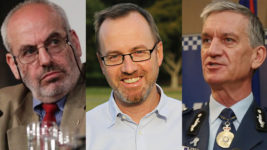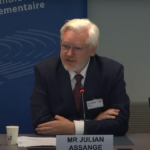Wodak & Shoebridge on Scipione’s Talk of Drug Law Reform

These days, it’s well understood that the war on drugs has been a monumental failure. And there’s perhaps no one better placed to understand this, than those at the frontline of enforcing the prohibitionist laws that wreak havoc in the community.
Former AFP commissioner Mick Palmer is renowned for asserting that Australia can’t arrest its way out of the drug problem. And he’s not the only ex-top brass turned drug law reformer. There’s once NSW police commissioner Ken Moroney, as well as ex-Tasmania police commissioner Jack Johnston.
And now, former NSW police commissioner Andrew Scipione has joined their ranks. At an 18 September NSW Ice Inquiry roundtable on drug decriminalisation, he called for a system of depenalisation for drug use and personal possession.
“Things have to change, because, necessarily, what’s happening at the moment isn’t working,” Mr Scipione told the meeting, which is significant as during his tenure as top cop, the drug war was intensified at the level of personal possession in the form of drug dogs and strip searches.
Scipione’s favoured depenalisation involves drug use and possession remaining a crime, but it allows police the discretion to impose a civil penalty instead of arrest. Whereas, decriminalisation involves removing the offences altogether and leaves civil penalties as the only course of action.
Drug prohibition has failed
“It was very significant that Mr Scipione acknowledged at the roundtable that current drug policy has failed,” said veteran drug law reformer Dr Alex Wodak, who was one of the other participants at the meeting.
“But how could any authority today have denied this, when over the last half century, the drug market in Australia and worldwide has grown substantially and become much more dangerous?” the Australian Drug Law Reform Foundation president asked.
Dr Wodak made clear that prohibition has seen an increase in drug production, consumption, the types of drugs available and the harms produced, as well as a rise in “deaths, disease, property crime and violence”, while prices have fallen, purity has often risen and all of it is “readily available”.
And he pointed to heroin as a pertinent example. According to the doctor, this drug was banned in 1953, however the problems with its use didn’t occur until much later. “There were six heroin overdose deaths in 1964, but 1,116 in 1999.”
“What Mr Scipione didn’t say was the scale of this policy failure. It’s been massive,” Dr Wodak told Sydney Criminal Lawyers. “If any company had performed as badly, it would have been declared bankrupt long ago.”
Dogs detect personal amounts
“I’m glad to see his change of heart,” said NSW Greens MLC David Shoebridge referring to Scipione. “It’s just a pity it didn’t happen while he had control of the NSW Police Force.” Andrew Scipione was NSW police commissioner between August 2007 and March 2017.
“He directed so many resources – whether it was through the drug dog program or aggressive policing at music festivals – to fighting the war on drugs and criminalising normally young people for personal possession.”
The NSW drug dog program began prior to the 2000 Sydney Olympics. And just a few years later, it was widely condemned after a 2006 NSW Ombudsman report revealed that only 26 percent of searches resulted in drugs being found, the majority of which were small amounts of cannabis.
Launched by Shoebridge and the NSW Young Greens, the Sniff Off campaign has revealed that, going back as far as 2009, searches following a drug dog indication have resulted in nothing being found around two-thirds to three quarters of the time.
“These effectively public confessions from Scipione are further confirmation that the drug dog program is illegitimate,” Shoebridge stressed. “Surely now, we should see the rest of politics get behind our long-standing demand of scrapping the drug dog unit.”
Depenalisation isn’t far enough
“What I can say is there’s willingness, I think, amongst law enforcers to look at options, to look at what we can do together,” Scipione told the meeting. However, he added that decriminalisation would be problematic due to the nation’s obligations under UN international drug conventions.
However, as raised at the roundtable, a recent position statement from the UN Chief Executives Board endorses decriminalisation of drug possession and use. And it recognises that the conventions have enough flexibility within them so that nations can tailor their own national drug policies.
Regarding the Scipione spruiked depenalisation, Shoebridge said, “There’s a real problem, when you rely on police discretion to decide whether or not somebody’s life is going to be permanently damaged by having a criminal record for possession or they’re going to be given a fine.”
As a working example of this system, Scipione cited the NSW cannabis cautioning scheme, which, since April 2000, has given officers the discretion to issue a caution to adults found in possession of up to 15 grams of cannabis. And the ex-head of police said the scheme “has been a useful thing”.
However, the highly derided sniffer dog program has been operating alongside the cautioning scheme. And the dogs have overwhelming led to people being searched over these small amounts of cannabis, and lately, to a dramatically increasing number of accompanying strip searches.
“If we decriminalise personal possession of drugs, that would remove the basis for the police to be undertaking the great majority of their strip searches,” Mr Shoebridge put forth. “That’s got to be a good thing for young people. And it’s got to be a good thing for civil liberties.”
Treatment should be available
Along with an ever-increasing number of civil society organisations, both Dr Wodak and Mr Shoebridge are calling for drug use and personal possession to be decriminalised in this state. And the pair both advocate for the legalisation and regulation of cannabis and MDMA.
Dr Wodak said Mr Scipione’s “support for expanding and improving drug treatment” on the day was also important. Even though he was the state’s reigning top cop at the time, Scipione related that he couldn’t find treatment for a close friend’s son – a successful businessman in his 30s.
UNSW Professor Alison Ritter told the decriminalisation roundtable that only half those seeking drug treatment in this state are receiving it. And she called for a doubling of investment in treatment, including in regional areas of NSW.
“The current rationing of drug treatment in Australia is an inevitable result of defining drugs primarily as a law enforcement problem,” Dr Wodak concluded.
“Unless and until drugs are understood to be primarily a health and social problem, there will be no votes in improving drug treatment and its quality and quantity will remain inadequate.”







